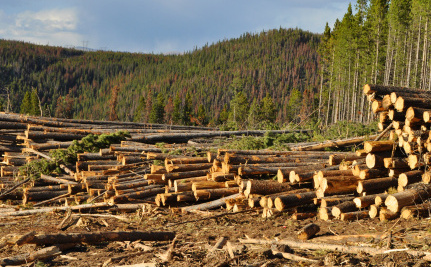
人类健康需要健康环境
<a href="../201812/t20181229_903800.html">2017年的日全食激发了大众的科学热情</a>(科学60S)
0:00/0:00
最新发布时间:
2014-12-10
Human Health Depends on a Healthy Environment
人类健康需要健康环境
A new study examines the links between environmental degradation and human illness. David Biello reports.
最新研究发现,环境退化与人类健康问题存在一定的联系。
撰文/播音 戴维•别洛(David Biello)
翻译 程孙雪子
What is the value of an intact rainforest? From a people perspective, maybe it's more useful turned into lumber and cropland.
一个未经破坏的热带雨林究竟有什么价值?从人类的视角来看,似乎把它变成木材和庄稼地,用处才更大。
The responses to such arguments have often cited what are called ecosystem services. These are the keys to life that natural systems provide for free—think: breathable air and potable water. Other counters point to the psychological benefits of the natural world. Now we have a new reason for conservation: human health.
这个问题的回答,通常都与一个词组有关——生态系统服务。所谓生态服务系统,是自然界无偿提供给有机生物界的许多关键物质,比如可呼吸的空气与可饮用的水源。除此之外,自然界还能给我们提供一些心理关怀。而现在,我们又有了保护环境的新理由:为了人类健康。
Turns out forest fires set to clear land in Indonesia generate the kind of soot that lodges in lungs and shortens lives across Southeast Asia. Dams and irrigation projects upriver in Africa increase the population of malarial mosquitoes downriver. These are just two of the examples from a new analysis in Proceedings of the National Academy of Sciences.
事实证明,印度尼西亚为开垦土地而烧毁那片森林时产生了大量烟尘,这些烟尘会进入人的肺部,缩短居住在整个东南亚的人的寿命。非洲河流上游的大坝与灌溉工程,使下游地区疟蚊的数量大大升高。这还仅仅是发表于《美国国家科学院院刊》最新研究成果中的两个实例。
Then consider big upheavals like global warming. Climate change means more deadly heat waves, allergies, infectious diseases and, potentially, a breakdown in food supplies. All obviously bad for human health.
再来看看如全球变暖的其它巨大变化。气候变化意味着更频繁的致命热浪的袭击、过敏、传染病以及潜在的食物短缺。显然,这对人类健康都是极为有害的。
Our understanding of these complex interactions is incomplete. For example, a given forest clearing may be good for some people's well-being but not others, both now and in the future. A better understanding of nature’s value will probably prove vital for human health in the 21st century.
我们对于这些复杂反应的认识是很不全面的。举例而言,砍伐森林可能有利于一部分人的生计,但对其他人的现在和将来则是有害的。更好地认识自然界的价值,对于21世纪的人类健康很可能至关重要。
查看更多
©2011- 版权所有:中国数字科技馆
未经书面许可任何人不得复制或镜像
京ICP备11000850号-1 京公网安备11010502039775号
京公网安备11010502039775号
信息网络传播视听节目许可证0111611号
国家科技基础条件平台
未经书面许可任何人不得复制或镜像
京ICP备11000850号-1
 京公网安备11010502039775号
京公网安备11010502039775号 信息网络传播视听节目许可证0111611号
国家科技基础条件平台

















